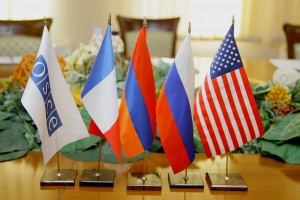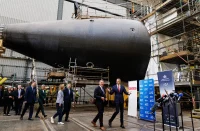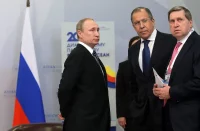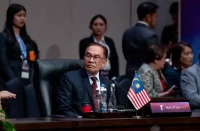The official framework for dealing with the Nagorno-Karabakh issue is the OSCE Minsk Group, but given its ineffectiveness in making concrete progress in the past two decades, it appears as though it’s time of relevance has passed. Clearly, the old method of dealing with the crisis simply hasn’t worked, and this is due to a few basic reasons:
Lack of interest
First of all, two of the mediators, the US and France, aren’t all that interested in fixing the problem, which may possibly be due to either the strong Armenian lobbies active in their countries and/or to their general disinterest in seeing the situation settled.
US:
The US derives geopolitical benefits from pursuing a divide-and-rule policy in the Caucasus, since it’s able to best spread its military influence (and consequently, its political and economic influence) in areas that are plagued with conflict by misleadingly presenting itself as an out-of-regional ‘mediator’. It was described in a previous article by the author how the US stands to gain from inciting a continuation war in Nagorno-Karabakh, but even in the absence of a hot conflict, one can still observe how Washington manipulates regional ‘cold wars’ to its advantage, with the Saudi-Iranian one in the Mideast serving as a perfect example. On the flip side, in South America (aside from Colombia), the US has scarcely any direct military influence over affairs because there are no frozen interstate conflicts or regional cold wars for the US to ‘mediate’.
France:
Addressing France, the country is more interested in its energy investments in Azerbaijan than its inter-governmental ones, hence why it hasn’t taken a strong stand in diplomatically resolving the conflict. So long as natural resources are flowing westward towards the EU and the French-based Total company is making money off of it, it doesn’t matter to Paris whether or not the war in Nagorno-Karabakh is ever resolved. In fact, it can even be argued that France doesn’t even have a Caucasian/Caspian vector of its foreign policy other than profiting of the energy trade, thereby making it an inadequate partner for negotiating with over that topic.
Lack of incentives
 The two greatest things that Azerbaijan can provide to its foreign partners are its natural resources and its geography, and it’s already given its Western partners in the Minsk Group the former. Since the US and France have both made hefty investments in the country’s energy sphere, and Washington is assured of non-Russian energy transit through the BTC and TANAP pipelines, there remains little else in this field for Baku to give. Therefore, it’s only natural for the US (less so for France, which as was discussed above, likely doesn’t even have a Caucasian/Caspian policy to begin with) to now begin asking Azerbaijan for geopolitical concessions in exchange for intangible Minsk Group ‘assurances’.
The two greatest things that Azerbaijan can provide to its foreign partners are its natural resources and its geography, and it’s already given its Western partners in the Minsk Group the former. Since the US and France have both made hefty investments in the country’s energy sphere, and Washington is assured of non-Russian energy transit through the BTC and TANAP pipelines, there remains little else in this field for Baku to give. Therefore, it’s only natural for the US (less so for France, which as was discussed above, likely doesn’t even have a Caucasian/Caspian policy to begin with) to now begin asking Azerbaijan for geopolitical concessions in exchange for intangible Minsk Group ‘assurances’.
Azerbaijan doesn’t have to provide any of these since it’s not receiving (or has ever received) anything concrete from the US in return, and this new round of give-and-take isn’t expected to be any different in that sense. What it will be different in, however, is the stakes and danger involved, since any further inroads by the US into Azerbaijan pose not only a threat to the country itself (as seen by its subversive interference through Radio Free Europe/Radio Liberty), but could rankle the geopolitical sensitivities of Russia and Iran, the two key countries that Azerbaijan will have to deal with in the 21st century. It wouldn’t make sense for Baku to risk their ire for naught, as this would only lead to an increased threat perception from both of them, ultimately leading to distressed relations and the potential for greater regional instability (all to the US’ benefit).
No lack of West-East rivalry
From the very beginning, the Minsk Group was doomed by the intrinsic geopolitical rivalry between the US and Russia, contemporarily exacerbated to extreme lengths by the Ukrainian Crisis. For as long as West-East tensions remain throughout the ‘New Cold War’ (and they show no signs of abating), then the Minsk Group will inevitably remain a frozen conversational forum that’s heavy on symbolism but short on substance.
Even prior to the recent tensions between the US and Russia, both sides had their respective, but divergent, interests that prevented any worthwhile settlement from occurring. The US did not want the conflict to be resolved at all for the reasons explained above, while Russia seemed unsure of its preferred solution. On the one hand, it was unevenly aligned towards Armenia at the time (seeing as how relations with Azerbaijan were at an historic low after the ceasefire), yet its concurrent federal intervention in Chechnya made it hesitant to support any secessionist movements in the Caucasus. This political paradox resulted in diplomatic pseudo-paralysis on the part of the Russian Federation, and combined with America’s purposeful inaction, the stalemate was drawn out and never fully resolved.
Concluding thoughts
In light of the current geopolitical confrontation between the West and Russia, it’s impossible for the Minsk Group to make take any constructive steps towards resolution of the Nagorno-Karabakh conflict. Conflicting interest considerations were preventing the Western members of the Group from making any progress on the issue before then, and these same obstacles still remain today. It needs to be recognized that the existing framework has been a failure and hasn’t resulted in any tangible results thus far, other than prolonging the conflict into the 21st century. Accordingly, with a new century brings with it new opportunities, and it’s necessary to leave the old process in the past and move towards new horizons. While the Minsk Group may have been last century’s way of trying to unsuccessfully resolve the Nagorno-Karabakh issue, the Shanghai Cooperation Organization might be the key to this century’s successes, and its benefits will be explored more in-depth in the follow-up article.
This and forthcoming articles on Nagorno-Karabakh settlement were prepared for Azerbaijani portal Moscow-Baku and published in English exclusively at ORIENTAL REVIEW.
Source in Russian: Moscow-Baku














Pingback: SCO will be the new framework for resolving the Nagorno-Karabakh conflict | Oriental Review
Pingback: How the West plans to prevent the SCO from mediating in Nagorno-Karabakh | Oriental Review
Pingback: Armenian-Azeri Tensions Just Got Alarming: Here’s Why It’s Happening (II) | Oriental Review
Pingback: SCO will be the new framework for resolving the Nagorno-Karabakh conflict – OrientalReview.org
Pingback: Les tensions azéri-arméniennes. Un nouveau front dans la guerre hybride ? (2/2) | Arrêt sur Info